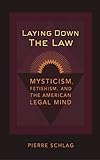Laying Down the Law : Mysticism, Fetishism, and the American Legal Mind / Pierre Schlag.
Material type: TextSeries: Critical America ; 83Publisher: New York, NY : New York University Press, [2020]Copyright date: ©1996Description: 1 online resourceContent type:
TextSeries: Critical America ; 83Publisher: New York, NY : New York University Press, [2020]Copyright date: ©1996Description: 1 online resourceContent type: - 9780814780534
- 9780814739532
- 340/.1 20
- KF380 .S32 1996eb
- online - DeGruyter
| Item type | Current library | Call number | URL | Status | Notes | Barcode | |
|---|---|---|---|---|---|---|---|
 eBook
eBook
|
Biblioteca "Angelicum" Pont. Univ. S.Tommaso d'Aquino Nuvola online | online - DeGruyter (Browse shelf(Opens below)) | Online access | Not for loan (Accesso limitato) | Accesso per gli utenti autorizzati / Access for authorized users | (dgr)9780814739532 |
Browsing Biblioteca "Angelicum" Pont. Univ. S.Tommaso d'Aquino shelves, Shelving location: Nuvola online Close shelf browser (Hides shelf browser)

|

|

|

|

|

|

|
||
| online - DeGruyter Greasers and Gringos : Latinos, Law, and the American Imagination / | online - DeGruyter Hair Matters : Beauty, Power, and Black Women's Consciousness / | online - DeGruyter When Sorry Isn't Enough : The Controversy Over Apologies and Reparations for Human Injustice / | online - DeGruyter Laying Down the Law : Mysticism, Fetishism, and the American Legal Mind / | online - DeGruyter In the Web of Class : Delinquents and Reformers in Boston, 1810s-1930s / | online - DeGruyter Making Capitalism Work : All Makes, All Models / | online - DeGruyter The Rise of Baptist Republicanism / |
Frontmatter -- CONTENTS -- ACKNOWLEDGMENTS -- I. INTRODUCTION -- ONE. This Could Be Your Culture -- II. THERE OUGHT TO BE A LAW -- TWO. Normative and Nowhere to Go -- THREE. Values -- FOUR. The Evaluation Controversy -- III. MISSING SUBJECTS -- FIVE. Contradiction and Denial -- SIX. Fish v. Zapp: The Case of the Relatively Autonomous Self -- SEVEN. How to Do Things with the First Amendment -- IV. LAW WITHOUT END -- EIGHT. Anti-Intellectualism -- NINE. 1. The 2. Legal 3. Form 4. of 5. Being -- V. EPILOGUE -- TEN. Laying Down the Law -- NOTES -- INDEX
restricted access online access with authorization star
http://purl.org/coar/access_right/c_16ec
In the collected essays here, Schlag established himself as one of the most creative thinkers in the contemporary legal academy. To read them one after another is exhilarating; Schlag's sophistication shines through. In chapter after chapter he tackles the most vexing problems of law and legal thinking, but at the heart of his concern is the questions of normativity and the normative claims made by legal scholars. He revisits legal realism, eenergizes it, and brings readers face-to-face with the central issues confronting law at the end of the 20th century.--Choice, May 1997 Pierre Schlag is the great iconoclast of the American legal academy. Few law professors today are so consistently original, funny, and provocative. But behind his playful manner is a serious goal: bringing the study of law into the late modern/ postmodern age. Reading these essays is like watching a one-man truth squad taking on all of the trends and movements of contemporary jurisprudence. All one can say to the latter is, better take cover.--J. M. Balkin, Lafayette S. Foster Professor, Yale Law School At a time when complaints are heard everywhere about the excesses of lawyers, judges, and law itself, Pierre Schlag focuses attention on the American legal mind and its urge to lay down the law. For Schlag, legalism is a way of thinking that extends far beyond the customary official precincts of the law. His work prompts us to move beyond the facile self- congratulatory self-representations of the law so that we might think critically about its identity, effects, and limitations. In this way, Schlag leads us to rethink the identities and character of moral and political values in contemporary discourse. The book brings into question the dominant normative orientation that shapes so much academic thought in law and in the humanities and social sciences. By pulling the curtain on the rhetorical techniques by which the law represents itself as coherent, rational, and stable, Laying Down the Law discloses the grandiose (and largely futile) attempts of American academics to control social and political meaning by means of scholarly missives.
Mode of access: Internet via World Wide Web.
In English.
Description based on online resource; title from PDF title page (publisher's Web site, viewed 06. Mrz 2024)


